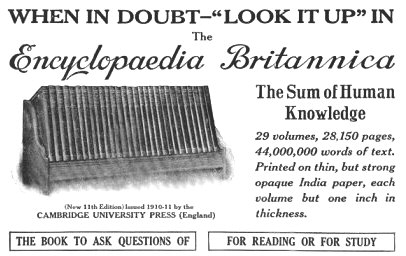12 Beyond Popular and Scholarly
Other Source Types
Popular and scholarly sources represent most of the source types you’ll use as beginner researchers. However, you may see other source types in a results list or use them yourself. Here’s a quick look at other source types you may come across:
Reference
A reference source provides introductory or background information about a topic, directed at students or the general public.

Examples of reference sources include:
- Encyclopedias
- Dictionaries
- Maps
- Your class textbooks
These sources provide overviews and timelines, define new vocabulary, and sometimes even recommend additional reading material.
Use these sources to review facts and get ideas for further research, but do not include them as sources in your assignments. Their contents are considered common knowledge (aka, not original ideas), and therefore the information does not usually require citation unless you quote it directly. If you make a direct quote it should be in quotes and cited. When in doubt, check with your professor or a librarian.
Do we still need reference sources in the age of Google (or AI?) Short answer: yes. Reference materials offer reliable information that has been reviewed by a real person – plus, they sometimes direct you to additional helpful sources.
Wikipedia
Wikipedia is a reference source. (It is also a popular source.) Unlike most encyclopedias, it does not go through a traditional editorial process, nor are many of its authors considered experts in their field (though some are). Instead, volunteer editors contribute to articles in their area of interest, leading to a crowd-sourced hub of information that is free to access and updated much quicker than a formal encyclopedia.
Caution is warranted when relying on information from Wikipedia. Without the same oversight as other reference sources, Wikipedia articles may contain incorrect, incomplete, or misleading information. Depending on the popularity of the article, and how many volunteer editors are keeping an eye on it, a mistake may live on the site for some time. (Note: Some popular articles limit editing access due to frequent “vandalism.”) However, it’s also true that Wikipedia’s reliability and comprehensiveness has increased dramatically since its founding in 2001.
Example

During the 2014 FIFA World Cup, the US men’s soccer team played and lost against Belgium. However, US goalkeeper Tim Howard managed an impressive 16 saves against the Belgian offense. Admiration for Howard quickly spread across the Internet. Shortly afterwards, a mischievous Wikipedia editor changed the entry for the U.S. Secretary of Defense from then-Secretary Chuck Hagel to Tim Howard.
The joke was caught and corrected quickly. However, this example demonstrates how quickly and easily an anonymous Internet user can edit articles on a site that many rely upon for quick, accurate information.
UMSL Libraries’ reference materials are on Level 2 (in print) and online!
Government Information
Government information is any documents, data, laws/policies, etc. produced, collected, or disseminated by a federal, state, or local government.

This category includes a variety of information types and formats: laws and regulations, data (e.g., census data), agency reports, government websites, etc. Examples of information you could get from government sources include:
- changes in demographic trends over time (from census data)
- current policy or laws on federal student loans (from the Department of Education website or Congress.gov)
- photographs of the 2024 solar eclipse (from the NASA Image and Video Library)
- local zoning ordinances/maps (e.g., St. Louis Zoning Map from the St. Louis city government website)
Did you know? You can search for government information by going to specific .gov sites or typing your topic into Google with the phrase site:gov.
Professional or Trade Publications
A trade publication communicates recent news and trends in a profession to members of that field. Trade publications are less formal than scholarly journals.

In addition to articles about major trends and updates, trade publications include other information of interest like targeted advertisements, job postings, or conference announcements. The author of an article in a trade publication may be a practitioner in that field or possibly a journalist with field expertise.
Browse through one or two of the following examples of trade publications (accessible freely online):
- Design News (engineering)
- Supermarket News (supermarkets)
- Pizza Today (pizza/pizzerias)
- ARTnews (art)
- American Libraries (libraries)
Conference Proceedings
Conference proceedings are collections of research papers or other information presented at a conference.
Conference proceedings may or may not be peer-reviewed (we cover peer review in an upcoming chapter). Sometimes, they offer an early glimpse of research findings that will be published again later as an independent journal article or in another publication. You are not likely to use conference proceedings in an undergraduate research assignment, but you may see them when searching library databases or Google Scholar.
Theses and Dissertations
Theses and dissertations are intensive student research projects completed as requirements for a master’s degree or Ph.D.
These publications are student works and, although they are supervised, are not peer-reviewed (we cover peer review in an upcoming chapter). In most cases, they are not appropriate to cite in your research assignments. However, if you find one relevant to your research topic, they can be excellent guides to additional sources relevant to your topic. Again, you may see these sources in the results list of a library database or Google Scholar.
Key Takeaways
- You’ll find many source types in the results list of a library search tool or other search engine. Even if you don’t use all of them for your research assignments, it’s helpful to recognize what they are and their target audience.
- Reference sources (including textbooks or Wikipedia) are helpful for gathering background information on your topic, but you shouldn’t cite them as sources for your assignments because they usually don’t contain original research or ideas.
- Unlike reference sources, government information, or (possibly) trade publications, you might not use conference proceedings or theses/dissertations in undergraduate research. But, you might still see them in a results list.

